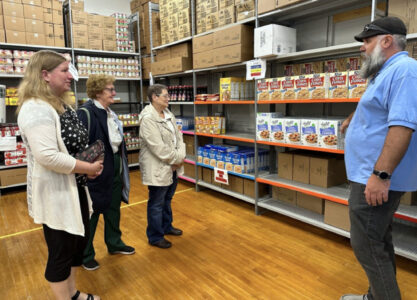SEDA-COG Joint Rail Authority prepares to sever tires with SEDA Council of Governments
LEWISBURG — An authority created in 1983 in response to Conrail’s abandonment of several unprofitable rail lines in central Pennsylvania will become an independent entity on Jan. 1.
That is when the SEDA-COG Joint Rail Authority severs its relationship with the SEDA Council of Governments that created it to preserve freight service.
It is a natural progression for a 42-year-old entity that has grown from initially owning 80 miles of track used by two shortlines, Steven Beattie, its executive director, said Monday.
Today the authority owns about 220 miles of track in Clinton, Centre, Columbia, Lycoming, Mifflin, Montour, Northumberland, Snyder and Union counties, over which six shortlines operate under the umbrella North Shore Railroad Co., based in Northumberland.
The switch will have no impact on its operation, a North Shore spokesperson said.
Beattie will remain the executive director and the authority will lease space in the SEDA building outside Lewisburg until it finds permanent space.
The three current SEDA employees assigned to the rail authority will make the switch as well.
The authority is embroiled in a 10-year-old lawsuit over which two companies should be operating the shortlines.
Susquehanna Union Railroad Co., the corporate name for North Shore, has been operating the trains from the outset.
When its then-current contract was about to expire, the authority sought proposals and received several.
In 2015, by a 7-3 vote, it chose Carload Express Inc. of Oakland, Allegheny County, over Susquehanna Union and awarded it a seven-year-contact.
Legal action began almost immediately but by agreement of the parties, Susquehanna Union continues as the operator despite its agreement having expired in 2017.
If Carload eventually is declared the operator, its seven-year agreement would start then.
The initial issue was what constituted a majority when the authority voted in favor of Carload.
The authority maintained and Clinton County Judge Michael F. Salisbury agreed that since 16 members were present, nine constituted a majority.
Six of the 16 abstained, five because their employers were North Shore customers. The railroad company argued the six did not have a conflict and should have voted.
A Commonwealth Court panel in 2018 reversed Salisbury, finding action may be taken by a majority of members voting as long as there is a quorum.
With the voting standard issue resolved that left the Susquehanna Union’s challenge of the validity of the authority vote.
Carload’s attempt to have that litigation dismissed failed in lower courts and the state Supreme Court refused to accept an appeal.
The case is back before Salisbury to decide a counterclaim by Susquehanna Union that raises procedure and ethical issues.
It wants the 7-3 vote invalidated and the request for proposals for an operator to start anew.
Its argument is that Donald Purcell, then a representative from Northumberland County, failed to comply with the required scoring methodology in ranking the three finalists.
Purcell gave no points for Susquehanna Union but in a sworn deposition stated he planned to give it 60 points out of a possible 100 but failed to complete his scoring sheet before submitting it.
Had he given Susquehanna Union 60 points its ranking would have been the same as Carload’s.
Several authority members said they voted for Carload because it had the highest ranking.


